中国の資金逃避がまた急増している・・そしてこのことがどうして暗号通貨に大ニュースか
何年か前のZeroHedge記事で、貿易名目で資金を持ち出す手法について解説してましたね。たとえば、1個100円の石鹸を深センー香港国境の保税倉庫まで持ち込み1000円で輸入したことにすると900円の資金を国外に持ち出せる。これにはさらにおまけ話があり、保税倉庫で輸入品の証明がもらえるので国内で高く売れると。大量のトラックが保税倉庫に押しかけていると。
ただその資金が暗号通貨に向かったかどうかは想像に任せるしかありません。
Officially, China has maintained quasi capital controls for years:
on paper no individual is allowed to move more than $50,000 out of the
country in any given year while Chinese companies can exchange yuan for
foreign currencies only for approved purposes.
公式には、中国は長年資本規制を行っている:書類上は個人で年間$50,000以上を国外に持ち出すことはできない、一方中国企業は政府認可のもとで人民元を海外通化に帰ることができる。
Unofficially, China's capital controls had been skirted for years, leading to massive capital outflow from the nation over the past decade, leading to such aberrations as massive luxury housing bubbles in places such as Vancouver, London, New York and San Francisco, and seemingly middle-class Chinese politicians and oligarchs sporting Swiss bank accounts funded in the hundreds of millions (or billions).
残念なことに、中国の資本規制は長年回避されてきた、この10年というもの巨額の資金が国外に流出した、これが以上とも言える巨額高給住宅バブルを海外で引き起こした、たとえばバンクーバー、ロンドン、ニューヨークそしてサンフランシスコ、そして中流クラスの政府官吏や成金たちはスイスの銀行口座に数百M(or B)の口座を開設した。
In fact, as we detailed in 2017, Beijing has an interesting way of dealing with capital outflows. While they closely monitor many methods, they don’t actively pursue shutting them down. They often watch from afar, and if capital reserves aren’t impacted, or their reputation isn’t damaged, they allow them to continue. The PBoC announced in 2017 they were going to deploy a massive anti-money laundering framework, designed to further halt capital outflows. As we said at the time, we’ll have to see if they were serious, or if this was just to win reputation points with international countries.
実際、ZeroHedgeが2017年に記事にしたが、北京政府は面白い方法で資金の海外持ち出しを許している。彼らは多くの手法を詳しくモニターしている一方で、積極的に取締を行わない。あとになってそれが判明しても、外貨準備にそれほど影響が無く、評判を落とさなければ、そのまま資本流出を許している。PBOCは2017年に巨大なアンチマネーロンダリング枠組みを展開しようとした、資本流出を止めるようなものだ。当時ZeroHedgeが揶揄した、もし彼らが真剣に取り組もうとしているのか、それとも単に国際社会での評判を気にしているだけなのかを見極めねばならない、と。
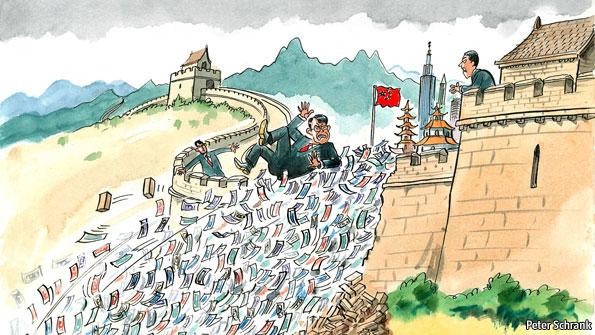
Well, two years later, we may have the answer. After an apparent lull
in outflows, potentially driven by the reforms cracking down on capital
flight, there are signs that China is facing an exodus of cash once
again...
あれから二年たち、その答えを知ることとなった。資本流出が収まった後、資本流出取締を見直しており、中国は再度現金の国外大脱出に直面している兆候がある・・・・
Amid all the headlines about China's surplus with US and the ongoing trade tensions, there was a message hidden in China's trade data...
中国の対米黒字のなかで貿易緊張が高まり、中国の貿易データに隠されたメッセージがあった・・・・・
It is that capital outflow probably accelerated significantly last month. It's a reminder of why the PBOC would probably be reluctant to let the yuan decline significantly. That would encourage even further outflows and risk a vicious circle.
While China's total imports fell 7.6% in dollar terms from a year earlier, its purchases from Hong Kong surged 106%.
先月、資本流出が大きく加速したとみられる。これで思い起こされるのは、どうしてPBOCは人民元の大幅下落を望むかということだ。この状況を見るとさらなる資本流出が起きると思われ、負のサイクルのリスクがある。中国のドルベースでの全輸入は一年前に比べ7.6%減っているが、香港からの輸入は106%増えている。
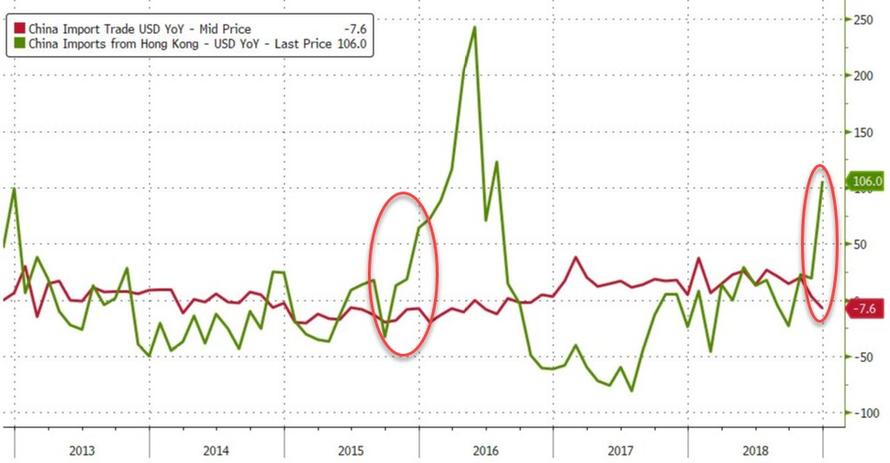
Critically, Elsa Lignos, global head of FX Strategy at RBC in London, notes that this outlier resembles the jump in 2015-2016 when mainland companies used inflated invoices to take money out of the country.
大切なことをElsa Lingonがこう述べている、彼女はロンドンを拠点とするRBCの為替主任ストラテジストだ、この急変は2015−2016のジャンプに似ている、当時中国本土企業は海外から水増し請求書を受け取るようになった。
The timing of the sudden shift is telling as it coincides with a lagged reaction to a sudden devaluation - just as we saw in 2015/2016...
急激に変動があった時期に遅れて人民元の急落があったーー我々は2015/2016に目の当たりにした・・・・
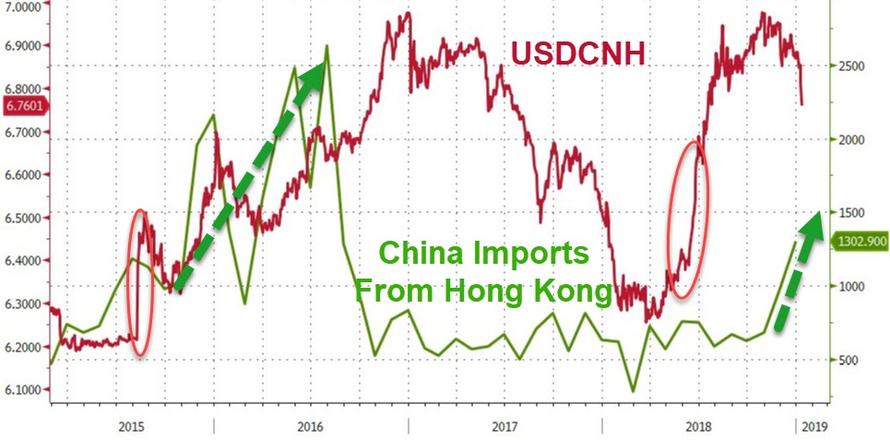
The logistics of the over-invoicing scam are extraordinarily simple - Mainland Chinese will 'overpay' for goods or services delivered from a Hong Kong merchant with a pre-agreement that the Hong Kong-based 'exporter' will - for a fee - allow the mainland Chinese 'importer' to have access to his cash but now outside of China's government-imposed firewall controlling capital flight.
過剰請求物流詐欺というのはとてもシンプルだ・・・。事前合意のうえ、中国本土側の中国人が香港商人からのモノやサービスに「過剰」支払いをする、香港側の「輸出者」は手数料として受け取りーー本土側の「輸出者」がその現金にアクセスする、しかしすでに中国政府が設定した資本逃避ファイアーウオールの外側の資金になっている。
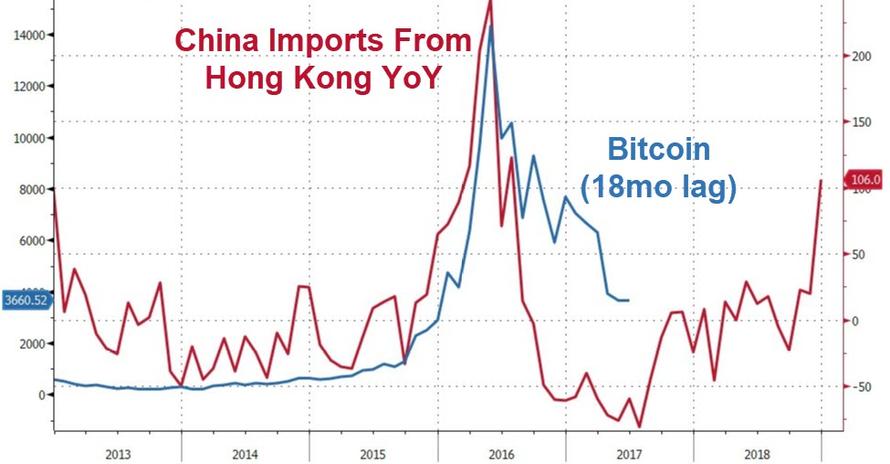
While some have argued that Bitcoin is not the most efficient method of funds transfer or storage once the mainland Chinese cash has reached Hong Kong (claiming hot money brokers reportedly cheaper), we suspect the ease of use may well mean the cryptocurrency sphere is facing an 18-month period of excess demand from Chinese capital desperate for its freedom.
一旦資金が香港側に写ってしまえばBitcoinは最良の送金手法でもないと言う人もいるが(熱銭ブローカーの方が手数料が安いという)、ZeroHedgeはこの手法が暗号通貨に多額の資金を供給し行き場を失った中国資金が18ヶ月にわたり過剰需要を生み出したと見ている。
So, in summary, recent 'odd' strength in the yuan is perhaps a signal that China is doing everything in its power to not give the impression that it is panicking...
というわけで要約すると、最近の「奇妙な」人民元の強さは、混乱の印象を与えないように、中国が全力で行っていると想像している・・・
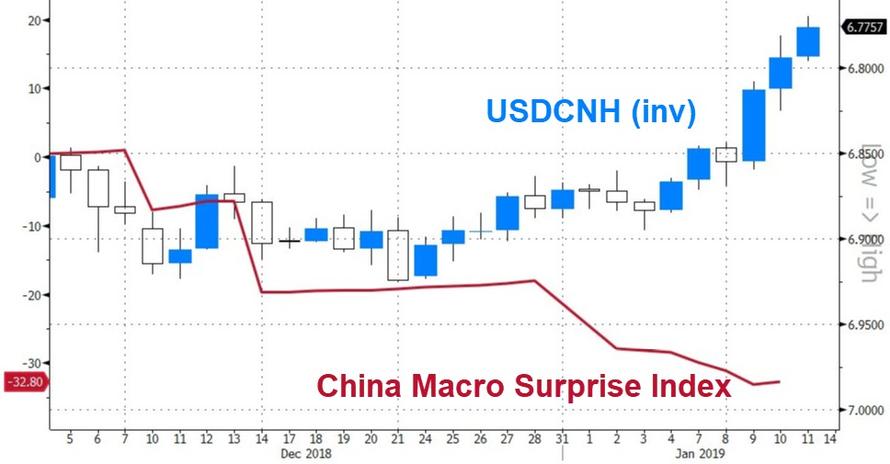
The truth is that it is one viral capital outflow report away from an outright scramble to enforce the most draconian capital controls in its history, which - as every Cypriot and Greek knows by now - is a self-defeating exercise and assures an ever accelerating decline in the currency, which authorities are trying to both keep stable while also devaluing at a pace of their choosing. Said pace never quite works out.
本当のところは、史上もっとも厳格な資本規制にもかかわらず、資金逃避のうわさが絶えないということだ、今となってはキプロスやギリシアの人はだれもが知っていることでーー自滅的な動きであり、さらなる通貨下落を引き起こす、当局は自らの選択で減価ペースを保ちたい一方でまだ為替維持に努めている。このペースが丸く収まるとは思えない。
公式には、中国は長年資本規制を行っている:書類上は個人で年間$50,000以上を国外に持ち出すことはできない、一方中国企業は政府認可のもとで人民元を海外通化に帰ることができる。
Unofficially, China's capital controls had been skirted for years, leading to massive capital outflow from the nation over the past decade, leading to such aberrations as massive luxury housing bubbles in places such as Vancouver, London, New York and San Francisco, and seemingly middle-class Chinese politicians and oligarchs sporting Swiss bank accounts funded in the hundreds of millions (or billions).
残念なことに、中国の資本規制は長年回避されてきた、この10年というもの巨額の資金が国外に流出した、これが以上とも言える巨額高給住宅バブルを海外で引き起こした、たとえばバンクーバー、ロンドン、ニューヨークそしてサンフランシスコ、そして中流クラスの政府官吏や成金たちはスイスの銀行口座に数百M(or B)の口座を開設した。
In fact, as we detailed in 2017, Beijing has an interesting way of dealing with capital outflows. While they closely monitor many methods, they don’t actively pursue shutting them down. They often watch from afar, and if capital reserves aren’t impacted, or their reputation isn’t damaged, they allow them to continue. The PBoC announced in 2017 they were going to deploy a massive anti-money laundering framework, designed to further halt capital outflows. As we said at the time, we’ll have to see if they were serious, or if this was just to win reputation points with international countries.
実際、ZeroHedgeが2017年に記事にしたが、北京政府は面白い方法で資金の海外持ち出しを許している。彼らは多くの手法を詳しくモニターしている一方で、積極的に取締を行わない。あとになってそれが判明しても、外貨準備にそれほど影響が無く、評判を落とさなければ、そのまま資本流出を許している。PBOCは2017年に巨大なアンチマネーロンダリング枠組みを展開しようとした、資本流出を止めるようなものだ。当時ZeroHedgeが揶揄した、もし彼らが真剣に取り組もうとしているのか、それとも単に国際社会での評判を気にしているだけなのかを見極めねばならない、と。

あれから二年たち、その答えを知ることとなった。資本流出が収まった後、資本流出取締を見直しており、中国は再度現金の国外大脱出に直面している兆候がある・・・・
Amid all the headlines about China's surplus with US and the ongoing trade tensions, there was a message hidden in China's trade data...
中国の対米黒字のなかで貿易緊張が高まり、中国の貿易データに隠されたメッセージがあった・・・・・
It is that capital outflow probably accelerated significantly last month. It's a reminder of why the PBOC would probably be reluctant to let the yuan decline significantly. That would encourage even further outflows and risk a vicious circle.
While China's total imports fell 7.6% in dollar terms from a year earlier, its purchases from Hong Kong surged 106%.
先月、資本流出が大きく加速したとみられる。これで思い起こされるのは、どうしてPBOCは人民元の大幅下落を望むかということだ。この状況を見るとさらなる資本流出が起きると思われ、負のサイクルのリスクがある。中国のドルベースでの全輸入は一年前に比べ7.6%減っているが、香港からの輸入は106%増えている。

Critically, Elsa Lignos, global head of FX Strategy at RBC in London, notes that this outlier resembles the jump in 2015-2016 when mainland companies used inflated invoices to take money out of the country.
大切なことをElsa Lingonがこう述べている、彼女はロンドンを拠点とするRBCの為替主任ストラテジストだ、この急変は2015−2016のジャンプに似ている、当時中国本土企業は海外から水増し請求書を受け取るようになった。
The timing of the sudden shift is telling as it coincides with a lagged reaction to a sudden devaluation - just as we saw in 2015/2016...
急激に変動があった時期に遅れて人民元の急落があったーー我々は2015/2016に目の当たりにした・・・・

The logistics of the over-invoicing scam are extraordinarily simple - Mainland Chinese will 'overpay' for goods or services delivered from a Hong Kong merchant with a pre-agreement that the Hong Kong-based 'exporter' will - for a fee - allow the mainland Chinese 'importer' to have access to his cash but now outside of China's government-imposed firewall controlling capital flight.
過剰請求物流詐欺というのはとてもシンプルだ・・・。事前合意のうえ、中国本土側の中国人が香港商人からのモノやサービスに「過剰」支払いをする、香港側の「輸出者」は手数料として受け取りーー本土側の「輸出者」がその現金にアクセスする、しかしすでに中国政府が設定した資本逃避ファイアーウオールの外側の資金になっている。
And the last time this occurred at this kind of scale, it sent Bitcoin from $200 to $20,000...
そして、前回これがこの規模で起きた時、ビットコインが$200から$20,000に膨れ上がった・・・
そして、前回これがこの規模で起きた時、ビットコインが$200から$20,000に膨れ上がった・・・

While some have argued that Bitcoin is not the most efficient method of funds transfer or storage once the mainland Chinese cash has reached Hong Kong (claiming hot money brokers reportedly cheaper), we suspect the ease of use may well mean the cryptocurrency sphere is facing an 18-month period of excess demand from Chinese capital desperate for its freedom.
一旦資金が香港側に写ってしまえばBitcoinは最良の送金手法でもないと言う人もいるが(熱銭ブローカーの方が手数料が安いという)、ZeroHedgeはこの手法が暗号通貨に多額の資金を供給し行き場を失った中国資金が18ヶ月にわたり過剰需要を生み出したと見ている。
So, in summary, recent 'odd' strength in the yuan is perhaps a signal that China is doing everything in its power to not give the impression that it is panicking...
というわけで要約すると、最近の「奇妙な」人民元の強さは、混乱の印象を与えないように、中国が全力で行っていると想像している・・・

The truth is that it is one viral capital outflow report away from an outright scramble to enforce the most draconian capital controls in its history, which - as every Cypriot and Greek knows by now - is a self-defeating exercise and assures an ever accelerating decline in the currency, which authorities are trying to both keep stable while also devaluing at a pace of their choosing. Said pace never quite works out.
本当のところは、史上もっとも厳格な資本規制にもかかわらず、資金逃避のうわさが絶えないということだ、今となってはキプロスやギリシアの人はだれもが知っていることでーー自滅的な動きであり、さらなる通貨下落を引き起こす、当局は自らの選択で減価ペースを保ちたい一方でまだ為替維持に努めている。このペースが丸く収まるとは思えない。




